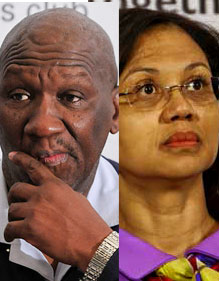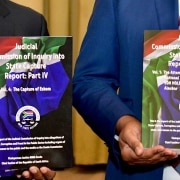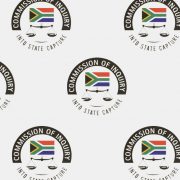|
Getting your Trinity Audio player ready...
|
 In what was arguably his most keenly anticipated Cabinet announcement, President Jacob Zuma both appeased and disappointed South Africans with the appointments and redeployments he revealed to the country on Sunday.
In what was arguably his most keenly anticipated Cabinet announcement, President Jacob Zuma both appeased and disappointed South Africans with the appointments and redeployments he revealed to the country on Sunday.
Economic prosperity, good governance and oversight and a clear commitment to combat corruption were key areas of pubic concern ahead of the announcement of the new cabinet. Some of the ministers and deputies in the over 70-strong executive have questionable credentials going into powerful public office posts, while some are expected to do much to restore the faith of citizens in government’s commitment to transparent, honest governance.
The bad news
For the bad news think Bheki Cele and Tina Joemat-Pettersson.
In December 2012, while announcing a Cabinet reshuffle, Zuma also announced that he had fired the then national police commissioner General Bheki Cele.
A Sunday Times exposé had in the previous year revealed that Cele had allegedly ignored tender procurement procedures to lease out a building in the Pretoria city centre that would serve as the South African Police Service headquarters. Acting on findings by both public protector Thuli Madonsela and a board of inquiry mandated with investigating Cele’s fitness for office, Zuma fired him two years into his post.
“A lot of good work has been done by SAPS,” Zuma said at the time. “However, the reports of the public protector and that of the board of inquiry indicate deficiencies administratively, and in particular in relation to General Cele’s duties as an accounting officer.” Madonsela’s report was from an investigation prompted by a complaint by the Institute for Accountability in Southern Africa and Pieter Groenewald of the FF+. Cele sought legal advice to act against his dismissal from office.
Madonsela had earlier in 2014 also identified Cele as one of the officials who had failed to curb wasteful expenditure during upgrades at Zuma’s Nkandla homestead, which she found to have unduly benefitted Zuma and his family.
While on the ANC campaign trail in Pretoria in April this year, Cele hit back at Madonsela. He was reported to have told a rally that Madonsela carries on like she is God, and people regard her as a second Jesus, when she is actually just an ordinary person.
When he announced Cele’s forced exit from public office, Zuma told the media that the former police boss still had a lot to contribute to the country, “given his experience and commitment to making South Africa a better place for all each day”.
Cele is now indeed back in the public service, in an office that is not without its fair share of controversy. He is deputy minister of agriculture, forestry and fisheries, second in command in a ministry and department that was revealed last year to have irregularly awarded an R800-million contract to the Sekunjalo consortium to manage the state’s fishery vessels. Madonsela found the then minister Tina Joemat-Pettersson, guilty of maladministration and improper and unethical conduct.
Tina Joemat-Pettersson
While many anticipated that Zuma would relieve Joemat-Pettersson – widely viewed as incompetent and unsuitable for public office – of her duties, she was shifted to head up the energy ministry. She replaced Ben Martins, who was removed from Cabinet altogether.
In June 2013, the Mail & Guardian reported that Joemat-Pettersson had revealed that she had lost respect for Madonsela’s office after she found herself the subject of an investigation over a costly overseas trip in 2010.
The findings were that Joemat-Pettersson should repay the state over R150 000 spent during a business trip to Sweden in 2010, from which she was urgently recalled by President Jacob Zuma. The minister had combined the trip with a holiday and the money was spent on return flights for her two children and their au pair. She was found to have contravened the ethics code for members of Parliament.
"This is an important institution," the minister said of Madonsela’s office. "I was actually quite sad with the manner in which the staff of the public protector dealt with my investigation. An institution that I had respect for, I have now actually lost respect for. There is no right or wrong. I have just lost respect for it."
For her part in the Sekunjalo deal, Madonsela had recommended that Zuma take disciplinary action against Joemat-Pettersson. The public protector also revealed that the minister had apparently interfered with her investigation by trying to get then-justice minister Jeff Radebe to end the “unnecessary” investigation as the Sekunjalo contract had already been withdrawn. Joemat-Pettersson too sought legal recourse against Madonsela in efforts to clear her name.
But far from being disciplined, Joemat-Pettersson has, in what is certainly the most scandalous of the appointments announced this week, been given the task of heading the sensitive and critically important energy ministry. Watch this space, that is if the lights stay on long enough to permit much by way of watching.
Corruption Watch executive director David Lewis commented: "While we have no problem with the notion that individuals can be rehabilated and returned to public service, these two individuals have shown not the slightest remorse for their past nefarious deeds. On the contrary, they have, by their intemperate and offensive remarks directed at the public protector, demonstrated their disrespect for the constitution and for their role as custodians of public resources."
The good news
New co-operative governance and traditional affairs minister Pravin Gordhan made great strides as finance minister in his efforts to curb wasteful public spending and to combat corruption in the management of public resources in national, provincial and local government.
Gordhan established a central office that deals with procurement related matters in government. He has attempted to bring greater coherence and oversight of public procurement by establishing the office of the chief procurement officer, headed by Kenneth Brown. Gordhan has also put punitive measures in place for municipalities that failed to demonstrate adherence to good governance legislation and regulation, by withholding their annual grants. There is no reason to believe that his long-serving deputy and now minister of finance, Nhlanhla Nene, will not extend the good work of his predecessor.
“At the same time,” commented Lewis, “we are delighted at Gordhan’s move to co-operative governance and traditional affairs, the ministry that exercises oversight of key areas of local and provincial government. These major sites of public spend are arguably the most corruption-riddled tiers of government and, partly in consequence, sites of increasing social unrest. On the basis of his record at SARS and in the finance ministry, there is no one better equipped to clean this up than Pravin Gordhan.”
Lindiwe Sisulu, now in human settlements, has, in her previous role as minister of public service and administration also been resolute in her determination to tackle corruption in the public service. Corruption Watch has received a large number of reports alleging corruption in the public housing sphere, particularly in the allocation of RDP houses. Lewis commented: “We look forward to engaging with Minister Sisulu in her new role, in which she will find corruption to be a major challenge.”.
Although the overhaul of the public service remains a work in progress, the Public Administration Management Act, piloted through Parliament during Lindiwe Sisulu’s tenure in that department, is, for the most part, a definite move in the right direction. Among other anti-corruption provision, the act prohibits public servants from doing business with the state, a move that is widely expected to reduce levels of corruption within the public sector.
The public can be reasonably confident that her successor, Collins Chabane, will, with his background in the ministry responsible for performance monitoring and evaluation, carry forward the good work that Sisulu has started.







